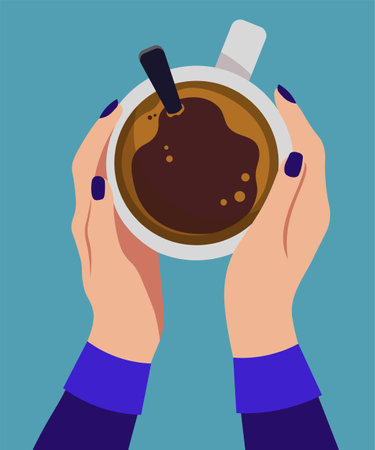Introduction: American Coffee Culture and Sleep Concerns
Coffee is more than just a beverage in the United States—it’s a daily ritual, a social connector, and an essential part of many Americans’ routines. From the early morning rush at local coffee shops to afternoon pick-me-ups in the workplace, coffee plays a central role in helping people stay alert and productive throughout the day. However, as caffeine is the main active ingredient in coffee, concerns about its potential effects on sleep quality have grown increasingly relevant. With more Americans reporting trouble falling or staying asleep, understanding whether enjoying that afternoon cup of joe could be interfering with restful nights has become a topic of both scientific study and everyday conversation. This article explores how the American love affair with coffee intersects with growing worries about sleep health, setting the stage for a closer look at whether drinking coffee later in the day might actually disrupt your ability to get a good night’s rest.
2. How Caffeine Works in the Body
Caffeine, the primary active compound in coffee, is a natural stimulant that primarily affects the central nervous system. When you drink coffee, caffeine is rapidly absorbed through your digestive tract and enters your bloodstream within 15 to 45 minutes. From there, it travels to your brain, where it blocks adenosine receptors—adenosine being a neurotransmitter responsible for promoting sleep and relaxation. By blocking these receptors, caffeine reduces feelings of tiredness and increases alertness.
Beyond its impact on the nervous system, caffeine also stimulates the release of adrenaline (the “fight or flight” hormone), which can elevate heart rate and boost energy levels temporarily. Additionally, caffeine increases metabolic rate slightly, which is why some people report feeling more energetic after a cup of coffee. However, these stimulating effects also mean that consuming caffeine too late in the day may disrupt your natural sleep-wake cycle.
Caffeine Metabolism and Individual Differences
The way your body processes caffeine is influenced by genetics, age, liver function, and even whether you smoke or take certain medications. The half-life of caffeine—the time it takes for half of the substance to be eliminated from your body—varies widely among individuals but generally ranges from 3 to 7 hours in healthy adults. For some people, caffeine lingers much longer, intensifying its potential to interfere with sleep if consumed in the afternoon.
Factors Affecting Caffeine Sensitivity
| Factor | Effect on Caffeine Metabolism |
|---|---|
| Genetics | Some genes make people fast or slow metabolizers of caffeine |
| Age | Older adults tend to metabolize caffeine more slowly |
| Liver Function | Liver diseases can prolong caffeine’s effects |
| Medications | Certain drugs can speed up or slow down caffeine breakdown |
| Pregnancy | Caffeine metabolism slows significantly during pregnancy |
Why It Matters for Afternoon Coffee Consumption
If you’re sensitive to caffeine or metabolize it slowly, drinking coffee even early in the afternoon could leave enough caffeine in your system by bedtime to disrupt your ability to fall asleep or achieve deep sleep. Understanding how your body responds to caffeine is crucial when deciding if that afternoon pick-me-up is worth the risk of a restless night.

3. Timing Matters: Afternoon Coffee Consumption
In the United States, the term “afternoon” typically refers to the hours between 12:00 p.m. and 5:00 p.m., though many Americans may see the afternoon winding down as early as 4:00 p.m. This time frame is important when considering coffee consumption and its potential impact on sleep. Many working adults reach for a cup of coffee during these hours to combat the so-called “afternoon slump,” a period of decreased alertness that often hits after lunch. However, the caffeine in coffee can linger in your system much longer than you might expect. Research suggests that caffeines half-life—the time it takes for your body to eliminate half of it—ranges from three to seven hours, depending on individual metabolism and sensitivity. That means a cup of coffee enjoyed at 3:00 p.m. could still be partially active in your system by bedtime, especially if you tend to go to bed before 11:00 p.m. Since evening routines in the U.S. often begin around dinner time (typically between 6:00 and 7:30 p.m.), any caffeine consumed in the late afternoon may interfere with your ability to wind down or fall asleep easily. Therefore, understanding not just how much but also when you drink coffee during the afternoon is key for maintaining healthy sleep patterns.
4. Scientific Evidence: Caffeine’s Impact on Sleep
Coffee is America’s go-to pick-me-up, but science has a lot to say about how that afternoon cup might affect your sleep. The active ingredient, caffeine, acts as a central nervous system stimulant, and its effects are largely dictated by its half-life—how long it takes your body to eliminate half of the consumed caffeine.
Caffeine Half-Life and Timing
Research consistently shows that caffeine’s half-life in healthy adults ranges from 4 to 6 hours, though some individuals metabolize it more slowly. This means if you have a 200 mg cup of coffee at 2 p.m., about 100 mg may still be in your system by 8 p.m.—prime time for winding down.
| Time of Consumption | Approximate Caffeine Remaining After 6 Hours |
|---|---|
| 12:00 p.m. | 50% |
| 2:00 p.m. | 50% |
| 4:00 p.m. | 50% |
Sleep Onset Latency, Duration, and Quality
Multiple studies published in journals like Sleep Medicine Reviews and the Journal of Clinical Sleep Medicine have found that consuming caffeine within six hours of bedtime can increase sleep onset latency (the time it takes to fall asleep), reduce total sleep duration, and worsen overall sleep quality. Even coffee consumed as early as 2 or 3 p.m. has been shown to decrease deep sleep stages later that night.
Summary Table: Afternoon Caffeine Effects on Sleep Metrics
| Caffeine Intake Time | Sleep Onset Latency (Minutes) | Total Sleep Duration (Hours) | Reported Sleep Quality |
|---|---|---|---|
| Noon or earlier | Normal (~15-20) | Normal (~7-8) | No significant change |
| 2-3 p.m. | Slightly increased (~20-30) | Slightly reduced (~6.5-7) | Mildly poorer quality |
| After 4 p.m. | Significantly increased (>30) | Reduced (<6.5) | Poorer quality, more awakenings |
The Bottom Line from Science
The scientific consensus is clear: even coffee consumed in the early afternoon can linger in your system and interfere with both falling asleep and staying asleep. If restful nights are a priority, consider making noon your personal caffeine cutoff.
5. Individual Differences: Genetics, Habits, and Tolerance
Not all Americans experience the same effects from drinking coffee in the afternoon. While some people can enjoy a cup of joe after lunch and still fall asleep without trouble, others find themselves tossing and turning late into the night. This variability is largely due to individual differences shaped by genetics, habitual caffeine consumption, and personal tolerance levels.
Genetic Factors Affecting Caffeine Metabolism
Your genetic makeup plays a significant role in how your body processes caffeine. Certain gene variations—particularly in the CYP1A2 gene—determine whether you are a “fast” or “slow” metabolizer of caffeine. Fast metabolizers break down caffeine quickly and are less likely to experience sleep disturbances, even if they drink coffee later in the day. In contrast, slow metabolizers process caffeine more slowly, allowing its stimulating effects to linger and potentially disrupt sleep.
Daily Habits and Lifestyle Choices
Caffeine’s impact on sleep also depends on your regular habits. Individuals who consume coffee daily often build up a tolerance to its effects, meaning their bodies adapt and become less sensitive over time. However, those who only occasionally drink coffee might find that even a single afternoon cup makes it difficult to fall asleep. Additionally, factors like diet, exercise routine, stress levels, and overall health can influence how caffeine affects your sleep patterns.
Tolerance: Building Up Resistance
If you regularly enjoy an afternoon latte or cold brew, your body may develop a degree of resistance to caffeine’s sleep-disrupting properties. Tolerance doesn’t mean caffeine has no effect at all—it just means you might not notice its impact on your ability to fall asleep as much as someone who rarely consumes it. That said, tolerance varies widely from person to person and can change over time based on your consumption habits.
Why Some Can Sleep—and Others Can’t
The bottom line is that genetics, lifestyle choices, and individual tolerance combine to create a unique response to caffeine for each person. That’s why some Americans can indulge in an afternoon coffee without sacrificing sleep quality, while others need to steer clear after noon to avoid insomnia. Understanding your own body’s response—and paying attention to how afternoon coffee affects your nighttime rest—can help you make more informed decisions about when to enjoy that next cup.
6. Practical Tips for Enjoying Coffee Without Losing Sleep
For many Americans, coffee is a beloved daily ritual. However, balancing coffee enjoyment with healthy sleep habits is crucial—especially if you find yourself reaching for that afternoon pick-me-up. Here are actionable strategies to help you savor your favorite brew without sacrificing restful nights.
Time Your Last Cup Wisely
The timing of your last cup of coffee can make all the difference. Aim to have your final caffeinated beverage at least 6-8 hours before bedtime. For most people, this means switching to decaf or non-caffeinated drinks after 2 p.m., especially if you’re sensitive to caffeine’s effects.
Opt for Lighter Roasts in the Afternoon
Lighter roasts often contain slightly more caffeine than dark roasts, but because they can taste milder, people sometimes drink them faster or in larger amounts. Be mindful of your portion sizes and consider choosing darker roasts or half-caff options later in the day to reduce your total caffeine intake.
Watch Hidden Sources of Caffeine
Coffee isn’t the only source of caffeine in the American diet. Sodas, energy drinks, chocolate, and even some medications can add to your daily tally. Read labels and keep track if you’re struggling with sleep despite managing your coffee consumption.
Create a Relaxing Evening Routine
If you love the comfort of a warm mug in the evening, try switching to herbal teas or other caffeine-free alternatives after dinner. A calming bedtime routine—free from screens and stimulants—can help signal to your body that it’s time for rest.
Personalize Your Approach
Individual sensitivity to caffeine varies widely. Track your own patterns: If you notice that even early afternoon coffee affects your sleep, adjust accordingly. Likewise, if you have no trouble falling asleep after an afternoon cup, enjoy—but stay attentive to any changes over time.
Prioritize Both Enjoyment and Health
Coffee can be part of a balanced lifestyle when consumed mindfully. By paying attention to timing, portion sizes, and your body’s unique response, you can continue to enjoy coffee’s perks while protecting your sleep—a win-win for American coffee lovers.

